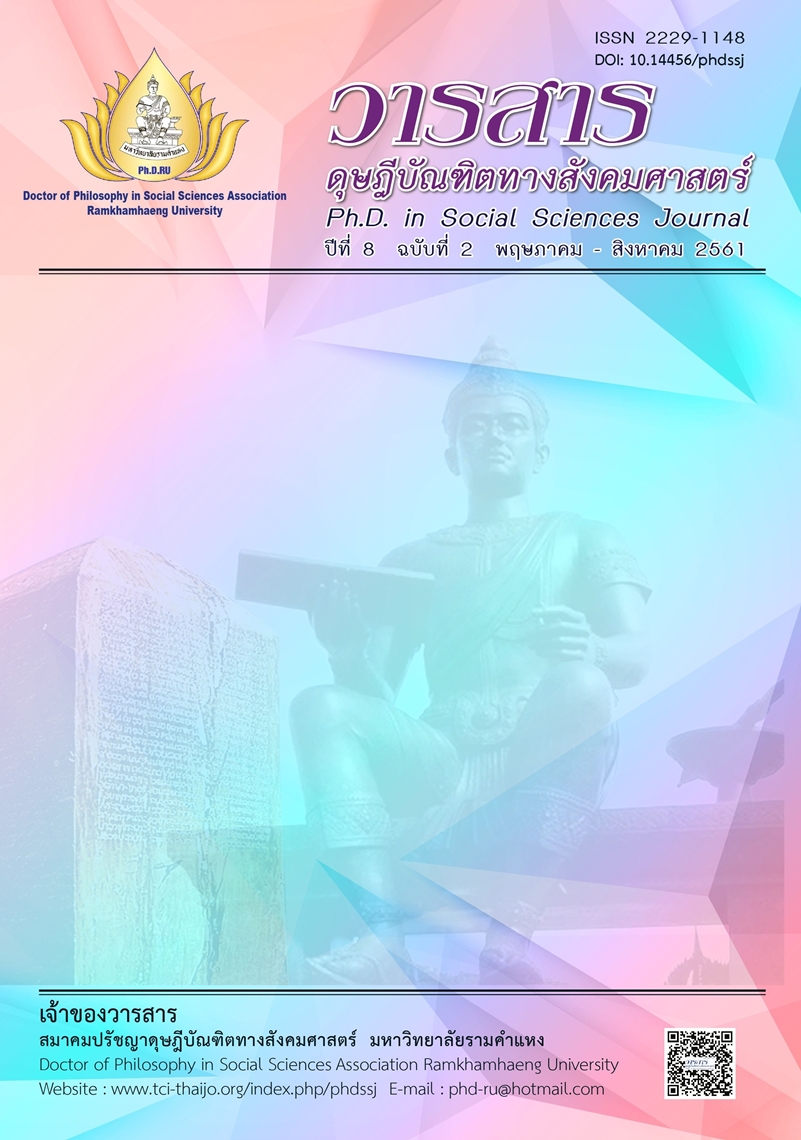FACTORS THAT EFFECT THE COMPETENCY AND ORGANIZATION CITIZENSHIP BEHAVIOR OF PEST CONTROL BUSINESS IN THAILAND
Main Article Content
Abstract
The purpose of this study was to determine the contributing factors influencing operator competency and organizational citizenship behavior of pest control businesses in Thailand. By collecting data from 440 samples which were the pest control businesses in Thailand and Using Structural Equation Model (SEM) for statistical analysis.
The results showed that: The factors as follows: relationship quality, knowledge management and integrated pest management had a positive influence on the operator competency directly. Besides, Operator competency, relationship quality and knowledge management had a positive influence on organizational citizenship behavior directly.
Article Details
Academic articles, research articles, and book reviews in the Ph.D. in Social Sciences Journal are author’s opinions, and not the publisher’s, and is not the responsibility of the Ph.D. in Social Sciences Journal Philosophy Association, Ramkhamhaeng University. (In the case that research is done on human, the researcher has to be trained in Ethics for Doing Research on Human Training and has to produce the evidence of the training).
References
Anderson, E. (1990). Customers Satisfied?, why not just ask them?: Transmission and Distribution. New York: Overland Park.
Baran, M., & Klos, M. (2014). Competency models and the generational diversity of a company workforce. Economics and Sociology, 7(2), 209-217.
Biala, J. (2013). Process, tools, and culture: Three dimensions of knowledge management. Alexandria, VA: Public Manager.
Cripe, E., & Manfield, R. (2012). Competency development guide.Fort Lauderdale, FL: Workitect.
Mourssi-Alfash, M. F. (2014). Workplace bullying and its influence on the perception of organizational justice and organizational citizenship behavior in higher education. Retrieved December 31, 2017, from https://search.proquest.com/openview/a499f993ccc9a422480ffb9408a8b077/1?pq-origsite=gscholar&cbl=18750&diss=y.3615122
McClelland, D. (1973). Model-building in the new economic history: Problems of definition arithmetic devices input- output models supply and demand models. The American Behavioral Scientist, 16(5), 631-651.
Megahed, A, M. (2012). Numerical study for the flow and heat transfer in a thin liquid film over an unsteady stretching sheet with variable fluid properties in the presence of thermal radiation. Journal of Mechanics, 28(2), 291-297.
Ministry of Agriculture and Farmers Welfare. (2015). Department of Agriculture and Cooperation. New Delhi: Author.
O’Brien, J. (2014). Diversity makes all the difference. Atlanta, GE: National Real Estate Investor.
Pais, C., & Others. (2015). A live-blog, one-listen review of one direction’s made in the A.M. Chicago: TCA Regional News.
Parry, S. (1998). Ben Bollinger: World class entertainment in the Inland Empire. Inland Empire Business Journal, 10(11), 7.
Pittenger, A. (2013). SAHBA touts the latest in home, patio supplies. Washington, DC: Tribune Business News.
Rodriguez, J. (2013). Altering the distinctive character of a mark. Managing Intellectual Property. London: N. A.
Spencer, L, M., & Spencer, S, M. (1993). Competence at work: Models for superior performance. New York: John Wiley & Sons.
Tepprasit, P. (2014). Land transportation entrepreneurs’ preparation to enter Asean Economic Community markets a case study: Small and Medium enterprise (SMEs) in Thailand. Journal of Business Administration, The Association of Private Education Institutions of Thailand, 3 (1), 33-40. [In Thai]
Tepprasit, P., & Yuvanont, P. (2015). The impact of logistics management in reverse logistics in Thailand’s electronics industry. International Journal of Business and Information, 10(2), 257-271. [In Thai]
Tepprasit, P., & Paopan, N. (2017). The reverse logistics management model: Thailand context. International Journal of Business and Information, 11(4), 385-403. [In Thai]
Vanichbuncha, K. (2014). Structural Equation Analysis (SEM) with AMOS. Bangkok: Chulalongkorn University Press. [In Thai]
Walker, J. (2016). Drugmakers point finger at middlemen for rising drug prices; pharmacy-benefit managers and the rebates they command come in for criticism by pharmaceutical executives. New York: Wall Street Journal.

